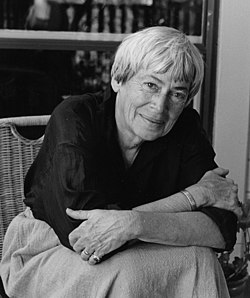Ursula K. Le Guin Quote
The word power has two different meanings. There is power to: strength, gift, skill, art, the mastery of a craft, the authority of knowledge. And there is power over: rule, dominion, supremacy, might, mastery of slaves, authority over others. Ged was offered both kinds of power. Tenar was offered only one. Heroic fantasy descends to us from an archaic world. I hadn’t yet thought much about that archaism. My story took place in the old hierarchy of society, the pyramidal power structure, probably military in origin, in which orders are given from above, with a single figure at the top. This is the world of power over, in which women have always been ranked low. In such a world, I could put a girl at the heart of my story, but I couldn’t give her a man’s freedom, or chances equal to a man’s chances. She couldn’t be a hero in the hero-tale sense. Not even in a fantasy? No. Because to me, fantasy isn’t wishful thinking, but a way of reflecting, and reflecting on reality. After all, even in a democracy, in the second decade of the twenty-first century, after forty years of feminist striving, the reality is that we live in a top-down power structure that was shaped by, and is still dominated by, men. Back in 1969, that reality seemed almost unshakable. So I gave Tenar power over—dominion, even godhead—but it was a gift of which little good could come. The dark side of the world was what she had to learn, as Ged had to learn the darkness in his own heart.
The word power has two different meanings. There is power to: strength, gift, skill, art, the mastery of a craft, the authority of knowledge. And there is power over: rule, dominion, supremacy, might, mastery of slaves, authority over others. Ged was offered both kinds of power. Tenar was offered only one. Heroic fantasy descends to us from an archaic world. I hadn’t yet thought much about that archaism. My story took place in the old hierarchy of society, the pyramidal power structure, probably military in origin, in which orders are given from above, with a single figure at the top. This is the world of power over, in which women have always been ranked low. In such a world, I could put a girl at the heart of my story, but I couldn’t give her a man’s freedom, or chances equal to a man’s chances. She couldn’t be a hero in the hero-tale sense. Not even in a fantasy? No. Because to me, fantasy isn’t wishful thinking, but a way of reflecting, and reflecting on reality. After all, even in a democracy, in the second decade of the twenty-first century, after forty years of feminist striving, the reality is that we live in a top-down power structure that was shaped by, and is still dominated by, men. Back in 1969, that reality seemed almost unshakable. So I gave Tenar power over—dominion, even godhead—but it was a gift of which little good could come. The dark side of the world was what she had to learn, as Ged had to learn the darkness in his own heart.
Related Quotes
About Ursula K. Le Guin
Le Guin was born in Berkeley, California, to author Theodora Kroeber and anthropologist Alfred Louis Kroeber. Having earned a master's degree in French, Le Guin began doctoral studies but abandoned these after her marriage in 1953 to historian Charles Le Guin. She began writing full-time in the late 1950s, and she achieved major critical and commercial success with the novels A Wizard of Earthsea (1968) and The Left Hand of Darkness (1969); these have been described by Harold Bloom as her masterpieces. For the latter volume, Le Guin won both the Hugo and Nebula awards for best novel, becoming the first woman to do so. Several more works set in Earthsea or the Hainish universe followed; others included books set in the fictional country of Orsinia, several works for children, and many anthologies.
Cultural anthropology, Taoism, feminism, and the writings of Carl Jung all had a strong influence on Le Guin's work. Many of her stories used anthropologists or cultural observers as protagonists, and Taoist ideas about balance and equilibrium have been identified in several writings. Le Guin often subverted typical speculative fiction tropes, such as through her use of dark-skinned protagonists in Earthsea, and she also used unusual stylistic or structural devices in books such as the experimental work Always Coming Home (1985). Social and political themes, including race, gender, sexuality, and coming of age were prominent in her writing. She explored alternative political structures in many stories, such as the philosophical short story "The Ones Who Walk Away from Omelas" (1973) and the anarchist utopian novel The Dispossessed (1974).
Le Guin's writing was enormously influential in the field of speculative fiction and has been the subject of intense critical attention. She received numerous accolades, including eight Hugo Awards, six Nebula Awards, and twenty-five Locus Awards; in 2003, she became the second woman honored as a Grand Master of the Science Fiction and Fantasy Writers of America. The U.S. Library of Congress named her a Living Legend in 2000, and in 2014, she won the National Book Foundation Medal for Distinguished Contribution to American Letters. Le Guin influenced many other authors, including the Booker Prize winner Salman Rushdie, David Mitchell, Neil Gaiman, and Iain Banks. After her death in 2018, critic John Clute wrote that Le Guin had "presided over American science fiction for nearly half a century", while author Michael Chabon referred to her as the "greatest American writer of her generation".
